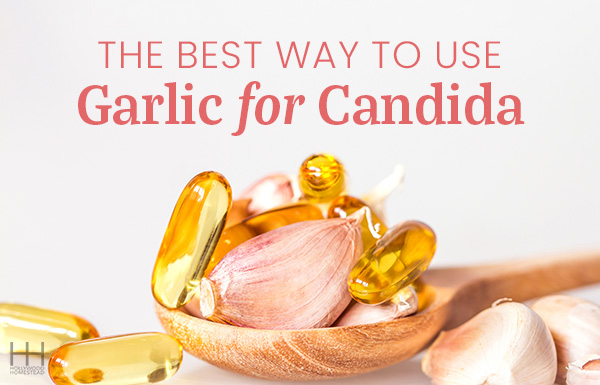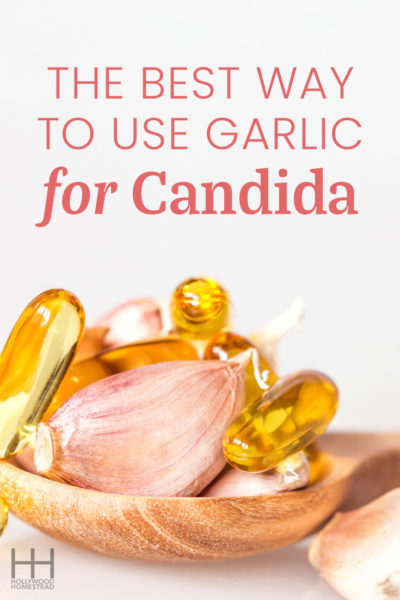
Candida overgrowth is one of the most prevalent fungal infections and can be the root cause behind a lot of unpleasant symptoms.
We recently talked about the antifungal properties of garlic in this post. Does that make garlic the perfect remedy for candida? The answer is YES – but you need to use it the right way.
What is Candida Overgrowth?
Candida albicans is a type of yeast that’s part of our natural microflora system. That’s right: a little candida is not a bad thing. The problem is when you have candida overgrowth (also known as candidiasis).
Candida – although it’s part of a healthy flora balance in small amounts – is actually the leading cause of fungal infections. (source)
What causes candida overgrowth?
There are a couple of main culprits behind candida overgrowth:
- High blood sugar or diabetes. Sugar feeds yeast, and when you have chronically high blood sugar levels it can lead to an overgrowth of candida. (source)
- Antibiotics. There’s a time and place for antibiotics, but they aren’t without side effects. One of the main causes of yeast infections is a round of antibiotics. (source) Why? Because antibiotics kill off all types of bacteria, which can really throw off the delicate balance of microorganisms in the body. This imbalance can lead to candida overgrowth.
- A weak immune system. Anytime the immune system is compromised, your body struggles to fight pathogens of all kinds. In this scenario, a healthy level of candida can quickly turn ugly and start to reproduce at unhealthy levels.
Symptoms of Candida Overgrowth
Some symptoms of candida overgrowth seem obvious, while others may surprise you:
- Yeast infections, thrush, and other fungal infections caused by candida
- Fatigue or general tiredness
- Digestive issues
- Chronic sinus problems
- Brain fog
- Sugar cravings
How NOT to Use Garlic for Candida
1. Eating a lot of Garlic
Unfortunately, sprinkling garlic powder over your meals isn’t going to do much good in the fight against candida.
Research says that allicin – a sulfur-based compound in garlic – works as an effective alternative antifungal. (source) But allicin has a couple of important characteristics you need to consider in order to reap those antifungal benefits:
1. Allicin is released when a raw clove of garlic is crushed.
2. Allicin is an unstable compound that quickly breaks down when heated or processed (including when you eat it).
Unfortunately, your favorite garlic seasoning probably doesn’t contain any allicin at all. Eating raw crushed garlic may have some benefits, but you’d have to eat a lot of it (and odds are your body can’t absorb allicin directly from raw garlic).
It’s also important to note that if you have SIBO or any condition where your digestive system is easily irritated, eating garlic isn’t recommended at all. Read why here.
Note: If you don’t have SIBO or any other digestive conditions, you can add small amounts of crushed raw garlic to your diet without much worry. Garlic does have nutritive properties as a whole food. (Eating too much is still not recommended, because eating tons of raw garlic can cause digestive irritation in almost anyone.)
2. Sticking Garlic Where It Doesn’t Belong
Okay, there’s a trend going around where women are using garlic cloves as a yeast infection remedy by inserting raw garlic into the vaginal canal. This is not recommended for a few reasons:
1. If you already have a yeast infection, garlic may cause even more irritation and burning on top of what you’re already experiencing.
2. In some cases, this may lead to secondary infections and other unwanted symptoms.
3. There’s not much evidence that this actually works.
In other words, this idea is far more likely to do harm than good. I’d say it’s better safe than sorry in this case!
What’s the best garlic supplement for candida?
So do garlic pills help with candida? The answer is that it depends on the quality of the supplement and whether it contains the active compounds in garlic – especially allicin.
Most garlic supplements go through processing that destroys most of the allicin, which means they won’t have any more benefit than adding garlic seasoning to your food.
I personally recommend using a high quality stabilized allicin supplement. Stabilized allicin is created under special controlled conditions to give it stability and bioavailability. This allows the allicin to be absorbed and do its job within your body.
Another benefit? Stabilized allicin is non-irritating to the digestive system, so it’s perfectly safe if you have SIBO.
Curious about stabilized allicin? Read my post about it here.
Have you struggled with candida overgrowth? Have you tried using garlic for candida? Share your thoughts and questions in the comments!

Latest posts by Sylvie McCracken (see all)
- Treating H. Pylori (Part 3): What H. Pylori Does to the Body - August 8, 2022
- Treating H. Pylori (Part 2): How H. Pylori is Contracted - August 3, 2022
- Understanding Beef Labels: Organic, Pastured, Grass-Fed & Grain-Finished - July 25, 2022